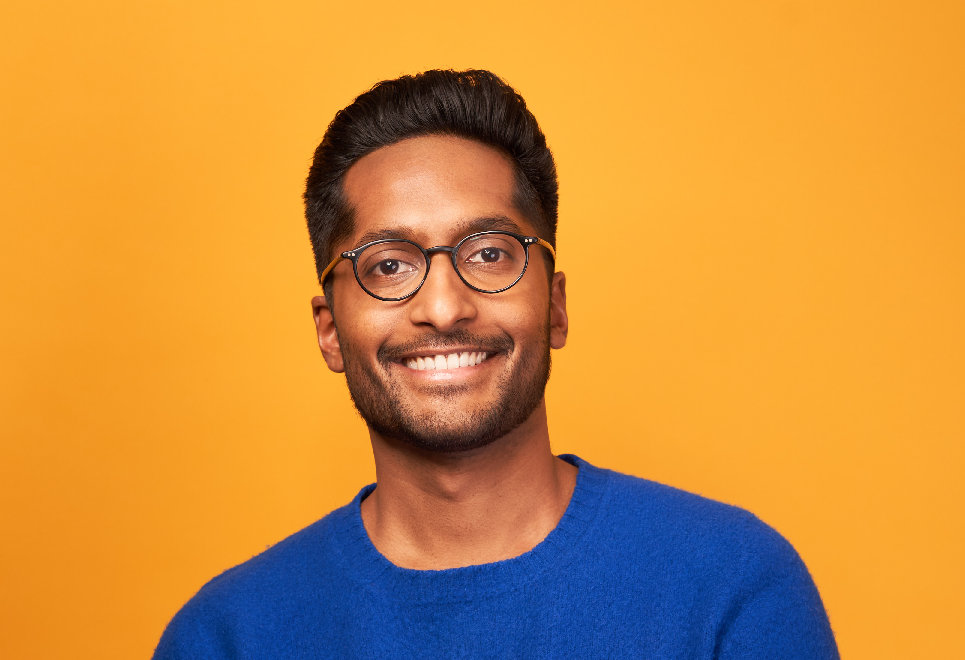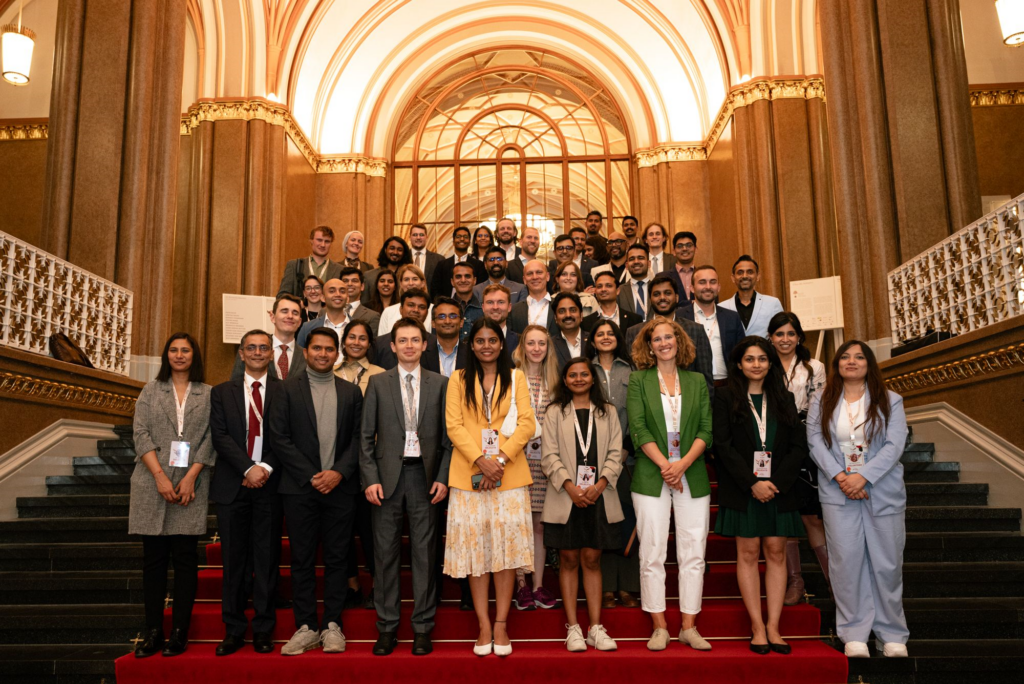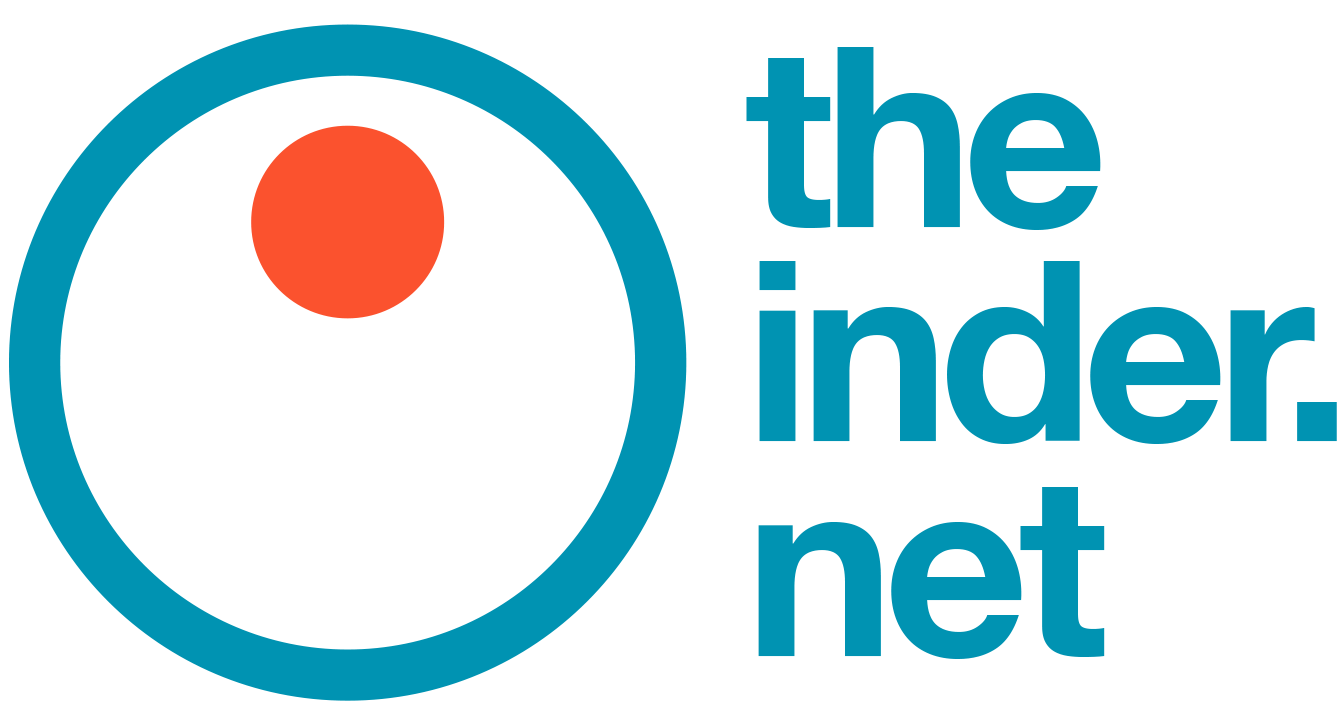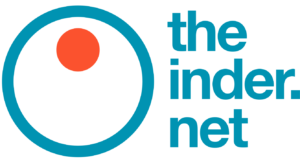
Jens Mannanal, co-founder of the Indo-German Young Leaders Forum and Passionfroot, discusses his professional experiences, the challenges on the path to entrepreneurship, and the influence of his cultural background. He explains the idea behind Passionfroot, a platform for creator marketing, and reflects on the successes and development of the Indo-German Young Leaders Forum. Jens also shares his views on the conditions for founders in Germany, especially for people with a migration background, and offers advice for young entrepreneurs. Additionally, he sheds light on the future role of the forum and German-Indian relations.
Can you tell us more about your personal background?
Although I was born in Switzerland, Cologne has always felt like home to me. That’s where I grew up and completed my Abitur at the Liebfrauenschule Cologne. My academic journey then took me to Mannheim for my bachelor’s degree and on to Paris at HEC, where I also spent a year at IIM Ahmedabad in India as part of my double master’s degree. IIM Ahmedabad is considered the most prestigious business school in India. This time was formative: I was recruited by Bain & Co. and had the opportunity to spend nearly three years in India before moving to Berlin. After my time in strategy consulting, I found my way into the tech scene, with a key role being my time at GetYourGuide, a unicorn, which prepared me for founding my first own company, Passionfroot.
What challenges have you faced on your path to becoming a founder, both professionally and personally?
The path to founding a company wasn’t direct but rather a gradual process. At first, I lacked the financial freedom to start immediately. But thanks to a scholarship from the German economy, I was able to gain valuable experience. Through participating in competitions and initiatives like the „Herausforderung Unternehmertum 2014“ and founding the HEC SEED Forum, my entrepreneurial spirit further developed. Ultimately, this led to co-founding the Indo-German Young Leaders Forum and eventually Passionfroot. The journey wasn’t always easy, but I learned that it takes persistence and courage to develop step by step.
What motivated you to take the entrepreneurial path and start your own company?
My gratitude towards the German state and society was an early driving force. Entrepreneurs are the innovators who shape and advance a society. In Germany, small and medium-sized enterprises (SMEs) generate about 55% of the gross domestic product and provide around 60% of jobs. The opportunity to implement my ideas while also contributing positively to society motivates me every day.
How has your cultural background influenced your career?
My cultural background has played a central role in my life. As the son of Indian immigrants, I learned from an early age to recognize and seize opportunities. Migrants, as research shows, often have a higher risk profile. Studies by KfW and DIW show that founders with a migration background in Germany are particularly innovative and twice as likely to operate internationally. At the same time, I found a strong social environment in Cologne that showed me the world is full of possibilities.
How did you come up with the idea for passionfroot.me, and what is your company’s main goal?
In 2021, we came together to create a solution for the growing number of new entrepreneurs on the internet—particularly those on social networks. According to Statista, there are more than 500,000 active creators on Instagram alone worldwide. The idea for Passionfroot emerged from months of conversations and analyses with creators and other stakeholders in the creator economy. Our goal is to provide this new group of digital entrepreneurs/creators with a comprehensive CRM and management tool that helps them work more efficiently and be successful in the long term.
Can you explain how passionfroot.me works and what added value it offers?
Passionfroot is an all-in-one platform for partnerships between creators and brands. In a $35 billion market that is growing by 30% annually, our platform enables creators and media companies to efficiently manage their partnerships—from bookings, calendar planning, and collaboration to payment processing. At the same time, it offers go-to-market teams at leading B2B and tech companies the opportunity to conduct and scale creator marketing campaigns.

What successes and milestones have you achieved with your company so far?
At the beginning of 2022, we closed a pre-seed round with Creandum and several angel investors and built our team. In 2023, we iteratively developed our platform and successfully raised more capital. Today, we are on track to scale our company sustainably and become the global number one in the creator management market. This journey has not only strengthened the company but also developed me as an entrepreneur and equipped me with the tools to approach future projects with even greater ambition.
What motivated you to get involved in the Indo-German Young Leaders Forum?
During my time in Ahmedabad, I met Max von Laer and Vishnu Ramdeo, and we quickly realized that we shared a common vision: to build a bridge between Germany and India. My involvement began with organizing the first event at the Indian Embassy, which focused on education. This combination of my background in India and my experience from Germany was a perfect fit. From there, the forum grew into what it is today.
What are the main goals of the Indo-German Young Leaders Forum, and what role does it play in promoting German-Indian relations?
The relationship between Germany and India is based on mutual respect and shared values. Bilateral trade between Germany and India amounts to around €30 billion. Our goal is to further strengthen this important geopolitical partnership. The forum promotes dialogue between young leaders from both countries to discuss important issues informally and build a lasting network. It’s about connecting future decision-makers and keeping the exchange alive.
What current projects or initiatives is the forum working on, and how do they contribute to strengthening cooperation between Germany and India?
Our main project is the annual conference, which we have been holding alternately in India and Germany since 2017. These conferences are a central meeting point for the exchange of ideas and networking. The conferences have attracted over 400 participants, including experts from business, politics, and academia. The most recent conference in 2023 took place in Bengaluru, and we are already planning the next event in New Delhi. In addition, we have found a strong partner in Global Bridges, with whom we are developing further projects to intensify cooperation between our countries.
What challenges do you see in the work of the forum, especially in the context of German-Indian cooperation?
The biggest challenge lies in the public perception of India in Germany. Unfortunately, we missed opportunities in the past by restricting the influx of skilled workers from India. Between 2000 and 2010, over 1 million Indians immigrated to the US, which has led them to make up about 15% of the workforce at leading tech companies like Google and Microsoft today. We now recognize the importance of this lost opportunity. It’s all the more important to build a strong bridge between Germany and India now to secure our prosperity while also supporting India on its path to becoming one of the most important democratic nations.
Can you name some successes or positive developments that have been achieved through the work of the forum?
Through our conferences, we have created a platform that has enabled a variety of positive developments. These include joint projects such as the implementation of airway aids in India during the COVID-19 crisis, the founding of new companies, and the official mention in the joint statement between Germany and India. It is a sign that we have created a sustainable exchange between young leaders from both countries.
What are your goals and visions for the future work of the Indo-German Young Leaders Forum?
We want to deepen the exchange between India and Germany further and bring together the best minds from both countries through our conferences and the ever-growing network. Our goal is to shape future leaders and make a valuable contribution to a strong partnership that will drive both countries forward.
How do you view the conditions for founders and startups in Germany, especially for people with a migration background?
Germany has great potential, but it often lacks the necessary support for entrepreneurs with a migration background. About a quarter of business startups in Germany are initiated by people with a migration background, but only a small fraction of them receive the necessary government or venture capital support. Many of these people bring innovative ideas and a high risk appetite, which is recognized as a great asset in other countries like the US. It is important to promote this talent and provide them with the necessary resources and a supportive environment. I firmly believe that a more diverse entrepreneurial landscape can significantly strengthen Germany’s innovation capacity and competitiveness.
What advice would you give to young people, especially those with a migration background, who want to start their own business or pursue a similar career path?
The earlier you start, the better. But it’s also important not to rush your own development. Young founders should know their strengths and be bold enough to use them without compromise. For some, it makes sense to get started right after their studies to make the most of their twenties. Others benefit from first gaining professional experience, building self-confidence, and achieving financial stability. The most important thing is to consistently put your thoughts and ambitions into action to avoid always chasing a “what if.”
How do you see the development of German-Indian relations in the coming years, and what role could the forum play in this?
The recent German-Indian government consultations mark the beginning of a new era. With the economic initiatives of recent years, particularly those promoted by the Ministry of Economics under the Greens, a solid foundation has been laid. The trade volume between Germany and India could multiply in the coming years. India will become Germany’s most important economic partner in our lifetime. The current trade volume is about 10% of what Germany has with China—but this dynamic will change rapidly in the coming decades. Organizations that recognize this development early on will not only be well-positioned but will also make an important contribution to Germany’s economic health.
Thank you for this insightful conversation!
Foto: (c) J. Mannanal








